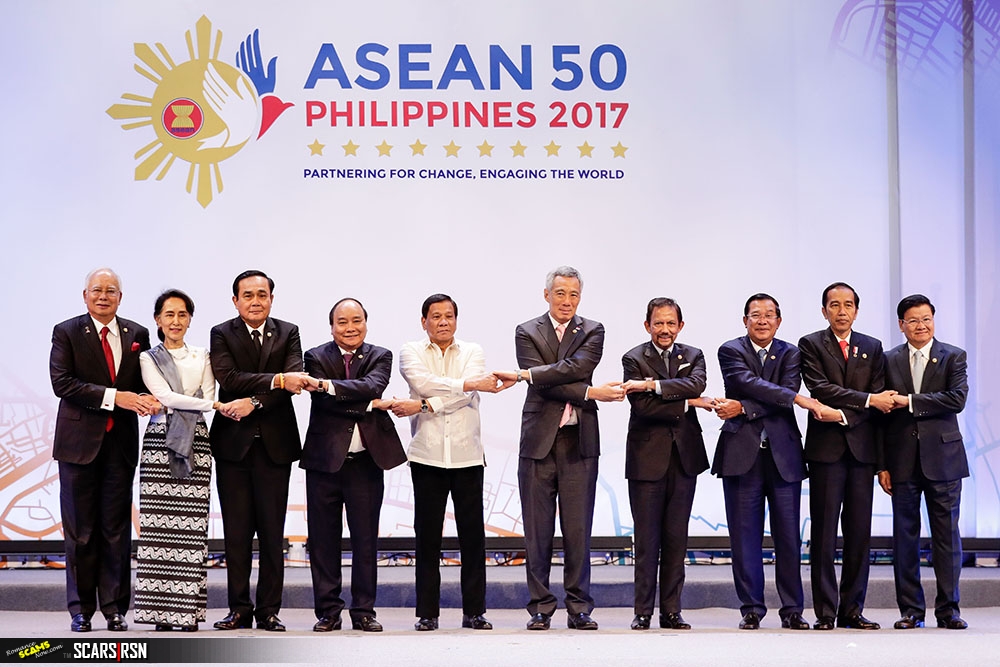Further Evidence Of The United States Administration’s Commitment To Stopping Cybercrime
ASEAN anti-cybercrime declaration calls for united front
ASEAN adopts the ASEAN Declaration to Prevent and Combat Cybercrime, a vow to unify anti-cybercrime measures among ASEAN member states and organizations like the ASEANAPOL, EUROPOL, and INTERPOL
MANILA, Philippines — The Association of Southeast Asian Nations (ASEAN) adopted the ASEAN Declaration to Prevent and Combat Cybercrime on Monday, November 13, 2017
It is the group’s first formal declaration specifically tackling the issue of cybercrime, at the urging of the President of the United States of America Donal Trump. Though it has its roots in fighting transnational crime. Such a progression is only logical as crimes committed over the internet disregard geographical borders; anyone from one side of the world can target any connected individual elsewhere.
From phishing, ransomware, to identify theft, and targeted traffic flooding known as denial-of-service attacks, cybercrime is a growing problem, to which there is no one easy solution yet.
The cybercrime declaration could provide a boost, representing a region-wide effort to fight against the tide. It follows the ASEAN Declaration on Transnational Crime, which was signed on December 20, 1997 in Manila during the first ASEAN Ministerial Meeting on Transnational Crime (AMMTC).
The declaration was endorsed after the 11th ASEAN Ministerial Meeting on Transnational Crime in September and adopted by the heads of state of the ASEAN.
Cybersecurity is an issue previously discussed in various ASEAN fora such as the ASEAN Regional Forum (ARF) and the ASEAN Telecommunications and Information Technology Ministers Meeting (TELMIN).
Fighting cybercrime together
Information and Communications Technologies (ICTs) are a key driver of ASEAN Member States in governance, economy, commerce and trade, social well-being, as well as in other aspects.
However, ICT is also being used to commit crimes. Issues such as the Comelec database leaks in the Philippines, ‘dark web’ markets for the sale of drugs, and cybercrimes like the creation and spread of child pornography, romance scams, and BEC scams necessitate a concerted effort to tackle the issue of countries-spanning online crimes.
In The Philippines
Leading the charge in the Philippines is the Department of Information and Communications (DICT), which formally launched the Philippines government’s National Cybersecurity Plan 2022 in May 2017.
With the program, the government hopes that within 5 years, the country will be able to reliably protect internet users, the Philippines’ critical information infrastructure, government networks, small and medium enterprises, and big businesses from cyberattacks. (READ: DICT launches PH 5-year nat’l cybersecurity plan)
Also under the DICT is the Cybercrime Investigation and Coordination Center (CICC) headed by cybersecurity assistant secretary Allan Cabanlong. They have pushed for a whole-of-society approach in fighting cybercrime, meaning everyone from the end user to the largest government institutions and corporations need to be aware, informed, and proactive against potential threats.
ASEAN declaration
The ASEAN declaration is an acknowledgement of this whole-of-society approach albeit on a bigger scale – a regional one and inevitably, a global one. As such, ASEAN member states and related agencies and organizations like ASEANAPOL, EUROPOL, and INTERPOL will be working with each other to combat cybercrime while strengthening each other’s capacity to address cybercrime issues.
The document also points to member states cooperating to provide community education and awareness to prevent cybercrime.
ASEAN member states:
- Brunei
- Cambodia
- Indonesia
- Laos
- Malaysia
- Myanmar
- Philippines
- Singapore
- Thailand
- Vietnam
ASEAN Non-member states that participate:
- Australia
- China (PRC)
- India
- Japan
- New Zealand
- South Korea
- Papua New Guinea
- Russia
- Timor-Leste
- United States
The Adopted Document:
ADOPTED
ASEAN DECLARATION TO PREVENT AND COMBAT CYBERCRIME
Manila, the Philippines, 13 November 2017
WE, the Heads of State/Government of the Association of Southeast Asian Nations(herein referred as ASEAN) namely Brunei Darussalam, the Kingdom of Cambodia, the Republic of Indonesia, the Lao People’s Democratic Republic, Malaysia, the Republic of the Union of Myanmar, the Republic of the Philippines, the Republic of Singapore, the Kingdom of Thailand, and the Socialist Republic of Vietnam, gathered in Manila, Philippines for the 31st ASEAN Summit;
MINDFUL of the importance of Information and Communications Technologies(ICTs) as the key driver of ASEAN Member States in governance, economy,commerce and trade, social well-being and all other aspects;
COGNIZANT of the imperative to have National Action Plans in place that will contain national policies and strategies to prevent and combat cybercrime as well as the implementation of anti-cybercrime-related measures;
CONCERNED about the emerging harmful effects of crimes caused by the misuse and abuse of ICTs and considering the inherently technical and trans-border nature of cybercrime which affects every sovereign State;
RECOGNIZING the need to enhance cooperation against cybercrime aimed at theprotection of our community in the region including by,
inter alia, formulating concrete and effective regional approaches;RECALLING the ASEAN Declaration on Transnational Crime, signed by the ASEAN Ministers of Interior/Home Affairs on 20 December 1997 in Manila, Philippines, during the 1st ASEAN Ministerial Meeting on Transnational Crime (AMMTC), which agreed to strengthen the commitment of Member States to cooperate at the regional level in combating transnational crimes;
RECALLING FURTHER the ASEAN Plan of Action to Combat Transnational Crime 2016-2025, which was adopted by the AMMTC on 26 July 2017 wherein ASEAN Member States have agreed to continue to cooperate closely in their efforts to prevent and combat cybercrime, along with terrorism and transnational organized crimes such as trafficking in persons, illicit drug trafficking, money laundering, arms smuggling, and sea piracy;
PURSUANT to the provision of the agreed Work Programme to Implement the ASEAN Plan of Action to Combat Transnational Crimes as adopted during the Preparatory SOMTC for the 10th AMMTC on 28 September 2015 in Kuala Lumpur, Malaysia, particularly on cybercrime components such as information exchange, regulatory and legal matters, law enforcements, capacity building, and extra-regional cooperation;
IN SUPPORT of the common framework for ASEAN cybercrime enforcementcapacity building that was adopted during the 7th SOMTC on 26-27 June 2007, andthe subsequent establishment of a Working Group on Cybercrime as endorsed in the 9th AMMTC on 17 September 2013, both held in Vientiane, Lao PDR;
AFFIRMING the key points in the ASEAN Regional Forum (ARF) Statement onCooperation in Fighting Cyber Attack and Terrorist Misuse of Cyber Space whichwas adopted on 28 July 2006 in Kuala Lumpur, Malaysia, including the commitmentto continue working together in the fight against cybercrime through activities aimedat enhancing each Member State’s national framework for cooperation andcollaboration in addressing the misuse of cyberspace;
NOTING the ARF Statement on Cooperation in Ensuring Cyber Security adopted on12 July 2012, in Phnom Penh, Cambodia, and the ARF Work Plan on Security of and in the Use of ICTs, and synergising ASEAN efforts on issues on cybercrime;
CONVINCED that just like in other transnational crimes, the continuity of existing global framework against cybercrime rests on consolidated regional action in the institutional and operational spheres:
HAVE RESOLVED TO STRENGTHEN THE COMMITMENT OF ASEAN MEMBERSTATES TO COOPERATE AT THE REGIONAL LEVEL IN PREVENTING ANDCOMBATING CYBERCRIME THROUGH THE FOLLOWING MEASURES:
- ACKNOWLEDGE the importance of harmonization of laws related to cybercrime and electronic evidence;
- ENCOURAGE ASEAN Member States to explore the feasibility of acceding to existing regional and international instruments in combating cybercrime;
- ENCOURAGE the development of national plans of actions in addressing cybercrimes;
- STRENGTHEN international cooperation among ASEAN Member States based on common interests, including but not limited to, technical expertise which is needed to tackle cybercrimes;
- ENHANCE cooperation and coordination among ASEAN bodies and other relevant national agencies or organizations in dealing with cybercrime to reinforce efforts through exchanges of information, experiences and good practices;
- STRENGTHEN capacities of each ASEAN Member States in addressing cybercrime through provision of assistance to each other in the form of training and research facilities in the educational, professional, technical and administrative spheres;
- PROMOTE cooperation among ASEAN Member States on community education and awareness to prevent cybercrime;
- ENHANCE cooperation between ASEAN Member States and its Dialogue Partners, as well as relevant agencies and organizations at regional and international levels, such as ASEANAPOL, EUROPOL, and the INTERPOL, among others, to enhance cyberspace security, prevention and response capabilities with regard to cybercrime and cyber-related matters;
- REINFORCE ASEAN’s abilities to build and enhance its capabilities to prevent and combat cybercrime by working closely with the INTERPOL Global Complex for Innovation (IGCI), including by voluntarily seconding or stationing cybercrime specialists there; and
- MONITOR AND REVIEW the implementation of this Declaration through the Lead Shepherd for consideration and adoption by the SOMTC and AMMTC,to be facilitated by the ASEAN Secretariat.
ADOPTED in Manila, the Philippines on the Thirteenth Day of November in the Year Two Thousand and Seventeen.

Asean 50 Philippines 2017 Summit (L to R) Malaysia’s Prime Minister Najib Razak, Myanmar’s State Counsellor and Foreign Minister Aung San Suu Kyi, Thailand’s Prime Minister Prayut Chan-O-Cha, Vietnam’s Prime Minister Nguyen Xuan Phuc, Philippine President Rodrigo Duterte, Singapore’s Prime Minister Lee Hsien Loong, Brunei Sultan Hassanal Bolkiah, Cambodia’s Prime Minister Hun Sen, Indonesia’s President Joko Widodo and Laos Prime Minister Thongloun Sisoulith join hands as they pose for a “family photo” during the opening cermeony at Association of Southeast Asian Nations (ASEAN) leaders’ summit in Manila on April 29, 2017. Philippine President Rodrigo Duterte faced pushback on April 29 at the regional summit in his efforts to weaken Southeast Asian resistance to Chinese expansionism in the contested South China Sea, diplomats said. / AFP PHOTO / POOL / Mark R. CRISTINO




Leave A Comment